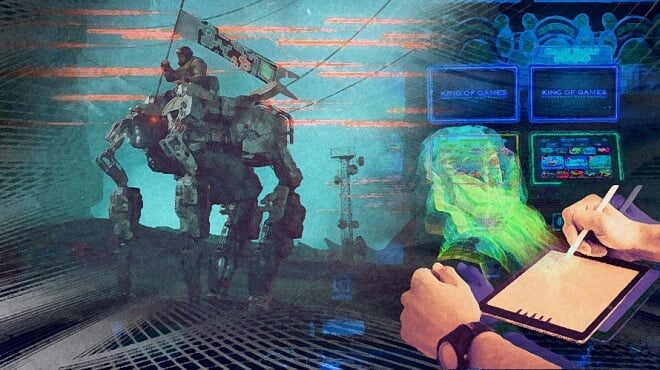When I tell people I work as a video game designer, I’m not talking about coding every line or drawing every sprite. I’m talking about designing game mechanics, level layouts, world building, and character development that bring digital worlds to life. A great designer turns a game concept into play—creating systems that engage, challenge, and reward.
In smaller game dev teams, roles often overlap, but in most video game development studios, a designer handles video game design and development tasks like documentation, gameplay tuning, and level design.
A developer or programmer handles the code, and an artist contributes visual design and sound effects. A junior designer we worked with once said, “I thought I needed to know everything about special effects artists and animation. Instead, I learned to think in systems—and to prototype like a writer.”
Key Takeaways
- Game designers create systems, mechanics, levels, and player experiences.
- Start by learning Unity or Unreal Engine—two popular game engines and building playable demos.
- You don’t need a degree, but you do need a strong portfolio and real-world experience.
- Entry-level roles in the video game industry pay ~$55K, with seniors earning $100K+.
Key Skills & Mindset
Creative & Story Skills
Great game designers are natural storytellers. You’ll use core skills like narrative thinking, character development, and world building to make mechanics feel emotionally grounded.
I keep a “mechanic journal” where I jot ideas like “movement powered by regret” or “sound reveals invisible enemies.” These ideas later become prototypes or features in playable builds.
As narrative designer Emily Short says, “All mechanics tell stories.”
Technical & Analytical Abilities
You don’t need to be a full-stack coder, but you do need technical skills. Focus on mastering one game engine like Unity or Unreal Engine, and learn to script, tweak, and build. A teammate of ours built a full dungeon crawler using Unity’s 2D tools—then balanced the game using spreadsheets, data tables, and player feedback.
If you want to stand out in the game industry, this blend of creativity and logic is key.
Soft Skills & Tools
Game development is highly collaborative. Clear communication, visual sketching, and prototyping in tools like Miro, Figma, or whitebox engines can help you pitch better ideas.
Studios regularly cite “communication and collaboration” as must-have game design skills. In fact, the IGDA’s 2023 report found 78% of game developers ranked soft skills above technical ones for junior hires.
Numbers to Know
- 70% of salaried game designers hold a bachelor’s degree in a related field.
- $99,800 is the average U.S. salary for video game designers (Glassdoor, 2025).
- 8% job growth expected for digital and interactive roles through 2033 (BLS).
- 45% of internships at game development studios in 2024 were remote-friendly (Handshake).
- 78% of hiring managers value communication over any specific programming language (IGDA 2023).
Education & Training Pathways

Bachelor’s Degree
A bachelor’s degree in game design, computer science, information technology, or digital arts can open doors. These programs teach essential knowledge like game theory, sound design, user psychology, and scripting. Both on-campus and online game design degree programs are available.
Bootcamps & Certificate Programs
Accelerated certificate programs like CG Spectrum or Thinkful offer intensive training in video game development, level layout, and system design. They’re especially helpful for career changers looking for job ready skills.
Self-Taught & Online Learning
If college isn’t your path, you can still break in. Sites like Coursera and Udemy offer top-rated tracks in video game design skills. A teammate of ours started by recreating old Zelda levels in RPG Maker—learning level design, visual design, and feedback loops all on their own.
Experience & Portfolio Building

Game Jams & Side Projects
Game jams give you deadlines, constraints, and a team. One of our colleagues built a “time swap” platformer in 48 hours that landed them a job interview. Building games teaches complex problem-solving through doing.
Internships & Entry-Level Roles
Apply to QA jobs, internships, or junior game designer roles. It’s not about the title—it’s about gaining real-world experience in how video game studios function, from pitch to polish.
Building a Strong Portfolio
Your playable portfolio is your most valuable asset. Include game levels, screenshots, quick videos, and a sentence or two about what problem each game solves. Show your process.
Potential employers want to see how you think. A clean, simple site with sound design, playability, and structure is more effective than flashy effects.
Industry Insights & Career Outlook

Duties & Specializations
Designers might specialize in level design, system design, sound design, economy tuning, or world building. AAA companies often prefer specialists, while indies look for flexible thinkers.
Salary & Advancement
According to recent labor statistics, the average salary for video game designers is nearly $100K. Entry-level roles start around $55K, and leads or specialists can earn over $110K.
Work Environment & Growth

The video game industry is now global and often remote-friendly. With enough experience, you can work your way up to creative director or start your own game development studio.
Actionable Next Steps
Want your dream job in video game design? Start now. Download Unity or Unreal Engine (make your own game engine), build a simple mechanic (like platforming or resource gathering), and test it.
Next, join a jam—there are hundreds online—and build something fast. Then ,polish and share your work in a public portfolio that shows you can solve real game design problems.
This is a rewarding career, but it starts with that first project.
FAQ
What qualifications do you need to become a game designer?
To become a video game designer, you’ll need a strong portfolio, technical skills, and familiarity with industry-standard game engines. A bachelor’s degree helps but isn’t required if you can demonstrate talent.
Is 30 too late to get into game development?
No—30 is not too late to start a career in game development. Many job applicants come from other industries and find success through self-taught paths or certificate programs.
Do game designers get paid well?
Yes, game designers get paid well. According to Glassdoor, average salaries in the U.S. are around $99,800, with experienced designers and team leads making significantly more.
Is game design math-heavy?
Game design involves logic and systems, but it’s not overly math heavy. You’ll use complex problem-solving and spreadsheets more than calculus—unless you focus on AI or economy balancing.
Sources cited
- https://www.glassdoor.com
- https://www.bls.gov
- https://www.igda.org
- https://www.handshake.com
- https://www.coursera.org
Written by Dustin Tyler [Updated June 24, 2025]
 Initially focused on web dev, Dustin was introduced to game design by a friend after college and was immediately attracted to the combination of technical skill and creativity required to make an awesome game.
Initially focused on web dev, Dustin was introduced to game design by a friend after college and was immediately attracted to the combination of technical skill and creativity required to make an awesome game.
While not a professional game developer himself, he’s utilized his web dev skills and desire to help others by creating a resource where expert game designers can share what they’ve learned with the next generation of aspiring game makers.